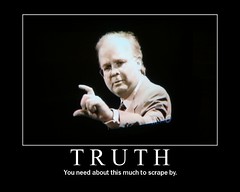Since I've got pretty limited internet time these days I haven't been doing my due diligence over in red blogtopia. One upshot is that while I've certainly heard Bush and his cohort claiming that the NSA surveillance program is legal, I haven't seen a single theory for how that could be so. Surely somebody's got one.
So consider part one of this post to be a research request directed at the hive mind: what arguments are being offered in defense of the legality of the NSA's domestic spying program?
Now for part two, in which I play devil's advocate and offer a naive justification or three for the legality of such programs. Here goes:
The Fourth Amendment protects not against a search simpliciter, but against a search conjoined with a seizure. The theory under which a wiretap is a violation of this provision, then, must show that the wiretap is, in some sense, a seizure. The doctrine currently accepted by the courts holds that a wiretap is a seizure because each citizen has a reasonable expectation of privacy, the violation of which constitutes a seizure. So, when a wiretap intrudes into an area in which a person had a reasonable expectation of freedom from government then the person has a constitutional right such that the intrusion be reasonable.
The two obvious lines of argument here are, first, that the NSA program doesn't intrude into an area where the individual has a reasonable expectation of privacy and, second, that even if it does the intrusion is reasonable. On the first point it could be said that one does not have a reasonable expectation of privacy when placing overseas calls, especially when those calls are made to known terrorists or their associates. On the second point the argument is that the reasonableness of an intrusion is determined by balancing the threat posed against the infringement of liberty committed, and that the vastness of the terrorist threat is such that the sorts infringements associated with wiretapping are easily outweighed.
Just for the record, I think the first line of argument is much stronger, since it has the resources to explain why court oversight was unnecessary. I also suspect that a zealous advocate could do better than I did in articulating just why there is no reasonable expectation of privacy here.
What's really interesting, though, is a third line of argument. I'll call it the
wingnut fantasy argument. The WFA holds that the received legal doctrine is entirely incorrect. That is, the argument claims that the Fourth Amendment is meant to protect property rights and since no property is threatened with seizure by a wiretap, no Constitutional protections are available. The best part is that what the WFA rejects is the very idea that the Constitution recognizes and protects an arena of personal privacy. Sweeeeeeeeeeeeet.



















